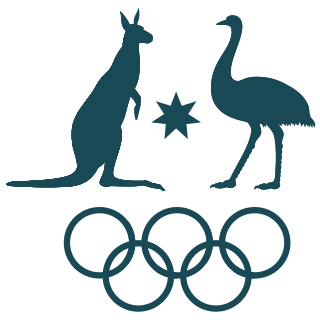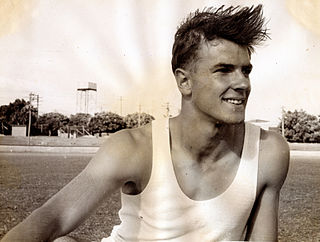
The Australian Institute of Sport (AIS) is a high performance sports training institution in Australia. The institute's 66-hectare (163-acre) headquarters were opened in 1981 and are situated in the northern suburb of Bruce, Canberra. The AIS is a division of the Australian Sports Commission (ASC), part of the Australian Government under the Department of Health and Aged Care.

Martin John Ferguson is an Australian former Labor Party politician who was the Member of the House of Representatives for Batman from 1996 to 2013. He served as Minister for Resources and Energy and Minister for Tourism in the Rudd and Gillard governments from 2007 to 2013.

The Australian Olympic Committee (AOC) is the National Olympic Committee responsible for developing, promoting, and protecting the Olympic Movement in Australia. The AOC has the exclusive responsibility for the representation of Australia at the Olympic Games, the Youth Olympic Games and at Regional Games patronized by the International Olympic Committee (IOC). All National Olympic Committees are constituents of the International Olympic Committee.

Sport is an important part of Australia that dates back to the early colonial period. Australian rules football, rugby league, rugby union, association football, cricket and tennis are among the earliest organised sports in Australia. Sport has shaped the Australian national identity through events such as the Melbourne Cup and the America's Cup. Australia also holds the record for the largest attendance at a rugby union match; almost 110,000 spectators watched the Wallabies play the All Blacks in 2000.

Sports in the Philippines is an important part of the country's culture. There are six major sports in the Philippines: basketball, boxing, tennis, football, billiards, and volleyball.
The Australian Sports Commission (ASC) is the Australian Government commission responsible for supporting and investing in sport in Australia. The Commission incorporates the Australian Institute of Sport. From 2018 to 2022, it was known as Sport Australia.
Roydon John Masters AM is an Australian sports journalist and former rugby league football coach. He is a sports columnist for the Sydney Morning Herald. He was a school teacher with an interest in team psychology who enjoyed some success as a schoolboy coach before embarking on a professional coaching career in the NSWRFL Premiership.

Richard Kevan Gosper, AO was an Australian athlete who mainly competed in the 400 metres. He was a Vice President of the International Olympic Committee, and combined Chairman and CEO of Shell Australia. Gosper died on 19 July 2024, at the age of 90.
Paralympics Australia (PA) previously called the Australian Paralympic Committee (APC) (1998–2019) is the National Paralympic Committee in Australia for the Paralympic Games movement. It oversees the preparation and management of Australian teams that participate at the Summer Paralympics and the Winter Paralympics.

Gregory Neil Hartung is a leading Australian and international sport administrator. He has an extensive and distinguished career in sport particularly in terms of administration and journalism. He was President of the Australian Paralympic Committee from 1997 to 2013 and served as vice-president of the International Paralympic Committee 2009–13.
Ted Harris, is an Australian businessman, director of companies, tennis commentator and sport administrator.
Mark Peters OAM is an Australian former baseball player, and sport administrator. From 2012 to 2018, Peters was the chief executive officer of the Gold Coast 2018 Commonwealth Games Corporation Organising Committee.
Boxing Australia Limited (BAL) is a governing body for the sport of amateur boxing in Australia. The Australian Sports Commission (ASC), Australian Olympic Committee (AOC), the Australian Commonwealth Games Association (ACGA), and World Boxing have recognized Boxing Australia as the National Sporting Organisation for amateur level boxing.
Perry Rothrock Crosswhite AM is a former Australian Olympic basketballer and leading sport administrator.
The organisation of sport in Australia has been largely determined by its Federal system of government – Australian Government and six states and two territories governments and local governments. All three levels play an important role in terms of funding, policies and facilities. Each major sport is managed by a national sports organisation, with state counterparts that manage community sporting clubs. Umbrella or peak organisations represent the interests of sports organisations or particular sport issues. Education sector plays a small role through universities and schools. Private sector's involvement is extensive in professional sport through facilities, club ownership and finance/sponsorship.

The history of sport in Australia dates back to the pre-colonial period of the country.

Glenn Robert Tasker was a leading Australian sport administrator particularly in swimming, tennis and the Paralympic movement. He was President of the Australian Paralympic Committee from 2013 to 2018.
Bruce Robert Mason OAM is a leading Australian sports scientist in the field of biomechanics. Between 1982 and 2014, he made a significant contribution to the Australian Institute of Sport (AIS) in the area of biomechanics, particularly in the sport of swimming.
Henry Alfred Gordon, was an Australian journalist, war correspondent, author, and historian of the Olympic Games. During his journalistic career, he served as editor of The Sun News-Pictorial, and editor-in-chief of The Herald and Weekly Times and Queensland Newspapers. From 1992 to 2015, he was the official historian of the Australian Olympic Committee.
Ju Ping Tian AM is a Chinese Australian gymnastics coach who was Head Coach of the Australian Women's Artistic Team and Australian Institute of Sport women's artistic program.








